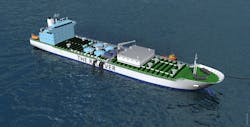Norwegian company EnviroNor sparked a healthy debate in Madrid at the recent WEX conference when it put forward an idea to turn redundant oil and gas tankers into mobile water treatment units.
The proposed system works by converting a used oil, gas or other product tanker into a treatment plant by fitting it with the necessary equipment, including filtersand piping, and making structural modifications to tank spaces.
Primary wastewater treatment would be carried out through a standard filtration method, which is followed by biological treatment to remove organic substrate and nitrification using moving bed biofilm reactors (MBBR) in two parallel lines.
The basic process can also include coagulation, floatation and sludge treatment, as well as biogas extraction, according to the firm.
Founder and general manager Sigmund Larsen came up with the idea when he saw a used municipality tanker in Dubai transporting wastewater from residential areas to treatment plants about 30km away in the desert.
Speaking to WWi magazine (Water & Wastewater International), Larsen said oil tankers are built to last 30 years but are often demolished before the end of their lives, sometimes even at 14 years, creating environmental challenges for owners.
He believes converting a vessel into a water treatment plant could take two to three years compared to the "seven to 10 usually taken to build a treatment plant on shore".
Larsen added that “a key advantage of the proposed system is that it is a flexible solution for recycling wastewater offshore that is based on proven technology but applied onboard a ship or a floating unit”.
Keith Hays, managing director of EMEA at Bluefield Research praised the concept for having "a number of clear advantages, primarily based on its mobility and portability", but added that the system could "face additional challenges in dealing with boat traffic and opposition from environmental groups".
###
- The full feature on the proposed floating water treatment vessels will appear in the April-May edition of WWi magazine. To receive your free copy, click here.
Read more
Mobile water systems: a compelling solution to emergency needs Expected to generate revenues of $895 million by 2016, the mobile water treatment market is accelerating to be a lucrative business. Read why…




